GoVertical
Senior Member

First buildings to come down with Calgary demolition incentive program
Four buildings in downtown Calgary will be torn down to make way for a 33-storey mixed-use tower, the first project under the city’s demolition incentive program. The project along 4 Avenue SW betw…
 livewirecalgary.com
livewirecalgary.com